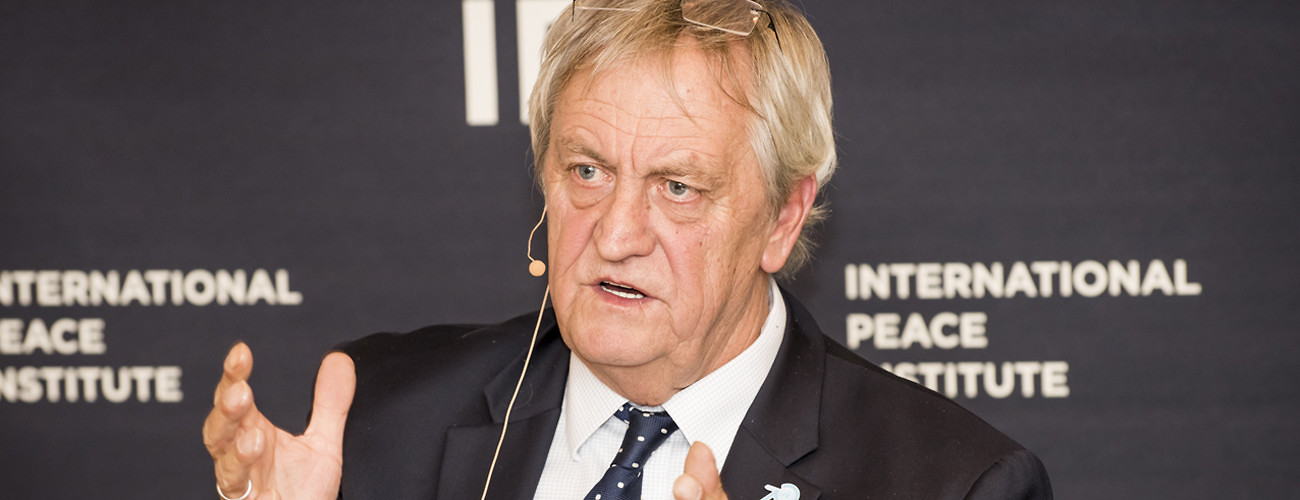United Nations Special Representative of the Secretary-General for Afghanistan Nicholas Haysom told an IPI audience that the country faced three transitions—security, economic, and political—and must manage them all to survive. “It has no option,” he said. “It can’t do two out of three and pass. If it goes down on the economy or on the security, or politically unravels, all three would be terminal.”
Mr. Haysom, head of the UN Assistance Mission in Afghanistan (UNAMA), said the country would face critical tests at upcoming donor conferences in Warsaw and Brussels.
“Afghanistan is aid dependent, and the challenges it faces requires at least the same level of aid in a context in which there are a number of other conflicts making demands for the donor community, and the international community generally, because already, many of the donor countries have agreed to take money to meet the demands arising out of the influx of migrants, out of the development aid budget,” he said.
“So Afghanistan faces these two events with the task of persuading the international community that it has so managed its transition that it is worth investing in.”
On the economic transition, he asserted that despite more than a decade of foreign aid, the level of poverty in the country is unchanged since 2001. Hopes for mineral wealth proved illusory, he said, and even the agricultural industry has suffered, with foods once exported for profit now being imported. The formerly booming transport and construction sectors have also crashed.
In the capital, there is pervasive joblessness. “What we have in Kabul might be described by some as a pre-Arab Spring moment, where youth with higher expectations are meeting a situation in which there are simply no jobs,” he said.
The year 2014 began a number of changes that complicated the security transition for Afghanistan, he said. A Government of National Unity was formed, including the newly elected President, Ashraf Ghani, and his onetime chief political rival, Abdullah Abdullah, as its Chief Executive. At the same time, the responsibility for combatting the Taliban was assumed by the Afghan National Security forces after the departure of international forces.
A key question facing the country’s future is whether the government, the Taliban, and the neighboring government in Pakistan recognize that the situation is ripe to make peace. “There are certainly pockets within the Taliban that appreciate that a future Afghanistan cannot be administered by one party, and who recognize that at the end of the day there needs to be a political solution,” he said.
While the Afghan and Pakistani governments have gone on the record to state their ultimate ambition is a negotiated solution, this has not translated into action by President Ghani yet. “The government is yet to establish its architecture for engaging in a peace process,” he said.
As for progress for engagement with the Taliban, the governmental body tasked with doing so since 2010, the High Peace Council, “has been in stasis for over a year,” he said. This, he said, is because the “government has recognized that there is limited space domestically for it to engage in a peace process.”
Summarizing his recommendations for the economic, political, and security transitions, Mr. Haysom said, “Viability for Afghanistan requires success over the transition, requires a Government of National Unity to stay together, requires Afghan National Security Forces to hold the ground, requires the economy not to suffer a major default, and it requires the international community to be forthcoming in Warsaw and Brussels.”
He also said that donors would want to see progress in constructing and improving a system for elections before pledging funds to Afghanistan in 2016. The international community “will not be forthcoming in Warsaw and Brussels unless there is demonstrable progress, in the reforms, notably the anti-corruption reforms inside Afghanistan, and one thing we haven’t mentioned, the donor countries, if only for their own domestic constituents, will want to see proof of further democratization in Afghanistan.”
Asked if the Islamic State of Iraq and Syria (ISIS) had made inroads into the country, he said the extent of their presence is still unclear, but that the UN does not “take it lightly.”
He said that this non-state actor presents a unique challenge for the UN, an organization of states. “We believe that whereas the Taliban generally have some respect to [the] humanitarian framework, humanitarian workers, UN in general, ISIS doesn’t, and that our staff would be targets, for both abduction and symbolic attacks, and it really does effect” UN planning, he said.
For UNAMA, “as a mission with 13 field offices across the country, we have to have as good a reading as we can of the ISIS presence, and threats to our staff and operations.”
He also added that Afghans had become the second most populous refugee group, behind those fleeing the Syrian civil war. “We don’t underestimate the number of Afghans,” he said. “They are clearly #2 just after Syrians and in some cases surpassing even Syrians, according to my European colleagues in Kabul.”
He said he considers part of his job encouraging the Taliban to speak with the government of Afghanistan. “My own position with them, that I shared with them, is that there can be no progress towards peace if you don’t engage with the government because that is the only way in which you can strike real bargains, reach compromises, or at the minimum reach agreements that would serve as the basis for arrangements by which Afghans live in peace together.”
The event was held as part of IPI’s Special Representative of the Secretary-General (SRSG) series.
Warren Hoge, IPI Senior Adviser for External Relations, moderated the discussion.
Watch event:








